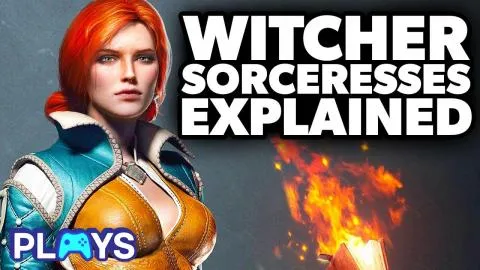Witcher's Sorceresses Explained! | MojoPlays

First off, sorceresses are a type of mage – which is really just a fancy word for saying “someone with magical abilities,” and like their male equivalent, sorcerers, only certain candidates are able to harness their magical abilities and become proper mages. These candidates, often children, are called “sources” and are recruited at young ages into magic academies for crucial training. The reason sources are recruited so young is because it’s vital that they quickly learn how to harness and control their magical abilities or else they risk destroying themselves and others in a downward spiral of madness and destruction. As, you see, the trials in becoming a sorceress (especially the mental strain) are so daunting that a lot of candidates are driven to the point of insanity and erupt into self-destruction. Thus, the journey in becoming a sorceress is both simple and yet very cruel: they either tame the magic within themselves or the magic takes over completely. This is why magic academies are so crucial, as they keep sources from going down a dark path and destroying – not only themselves – but humanity as well.
And – in the world of “The Witcher” – history accounted for the very idea that magic could (and would) be used for nefarious and evil purposes, as organizations were created to rule over and regulate magic for the sake of society. Initially, a very long time ago, bands of varying magical groups (along with the rulers of the time) signed a pact not to use magic against one another, knowing the risks could be never-ending and catastrophic. This initial pact then resulted in the construction of the Brotherhood of Sorcerers, which was magic’s regulatory body; it made sure that magic was being used to benefit society and that Dark Arts like Necromancy were only used for very select purposes (if at all). The Brotherhood functioned very much like a police force for mages of all types (including sorceresses), and they even punished and executed those members who broke the organizations’ rules. The Brotherhood also established the very magic academies that would train young sources into mature, powerful sorceresses.
But, as the Brotherhood grew and become more powerful, it ultimately got caught up in external political issues that would lead to its downfall. For instance, the ruling mages in the Brotherhood eventually became split in their support for the Northern Kingdoms and the Nilfgaardian Empire, and each side wanted to oust the other from power. Instead, with neither side willing to give ground, tensions resulted in the Thanedd Coup where many ruling mages on both political sides were killed in acts of violence that would soon disband the entire Brotherhood. But, from the ashes of the Brotherhood rose another group that would soon come to govern magic, formed entirely of sorceresses known as The Lodge of Sorceresses. This all-female group excluded men and governed magic from behind the scenes, feeling that male mages and sorcerers could not be trusted to govern magic because of their selfish egos and desires.
The Lodge of Sorceresses was started by Philippa Eilhart weeks after the collapse of the Brotherhood, and it vowed to remain politically neutral – despite containing members from both Nilfgaard and the Northern Kingdoms. The Lodge contained such powerful sorceresses as Triss Merigold, Keira Metz and briefly Yennefer of Vengerberg. Eilhart’s vision was for the Lodge to not only regulate all magic, but also to ensure that they next person to sit the throne was one of magical abilities that could influence the world according to the Lodge’s ideology. Knowing that Ciri was already the princess of the Northern Kingdom of Cintra, the Lodge desperately wanted to recruit her and steer her journey into power. It’s at this point that Yennefer falls out with the lodge, as she doesn’t trust that they have Ciri’s best interests at heart. Thus, there’s a race between Yennefer and The Lodge to find Ciri –one that’s ultimately won be Yennefer (with the help of Geralt). But, it doesn’t ultimately matter much as the Kingdom of Cintra comes under Nilfgaardian rule – with the Emperor having wed a Ciri imposter to gain power. With the failure of the Lodge’s plan to place one of its members into a position of political authority, it soon disbands and falls from power. And, without power, its members are targeted by Redania and Nilfgaard for being witches, leading to mass persecution, imprisonment, torture and even execution. So, similar to how Witchers are looked down upon by society, sorceresses are also shunned socially and risk their lives just for being themselves. Yet, within the mage community, sorceresses like Philippa Eilhart, Triss Merigold and Yennefer of Vengerberg are still held in high esteem.
Much like sorcerers, Witchers and other mages, the process of becoming a sorceress requires years of training, many personal dangers, and a life of hardship. But, the history behind the female mages is quite different from their male counterparts, and they even (at one point) were far more influential than the male sorcerers whose egos led to the ruin of the Brotherhood. Thus, despite being at odds with society, sorceresses are in no way secondary to their male equivalent and, perhaps, are even more powerful and knowledgeable.
